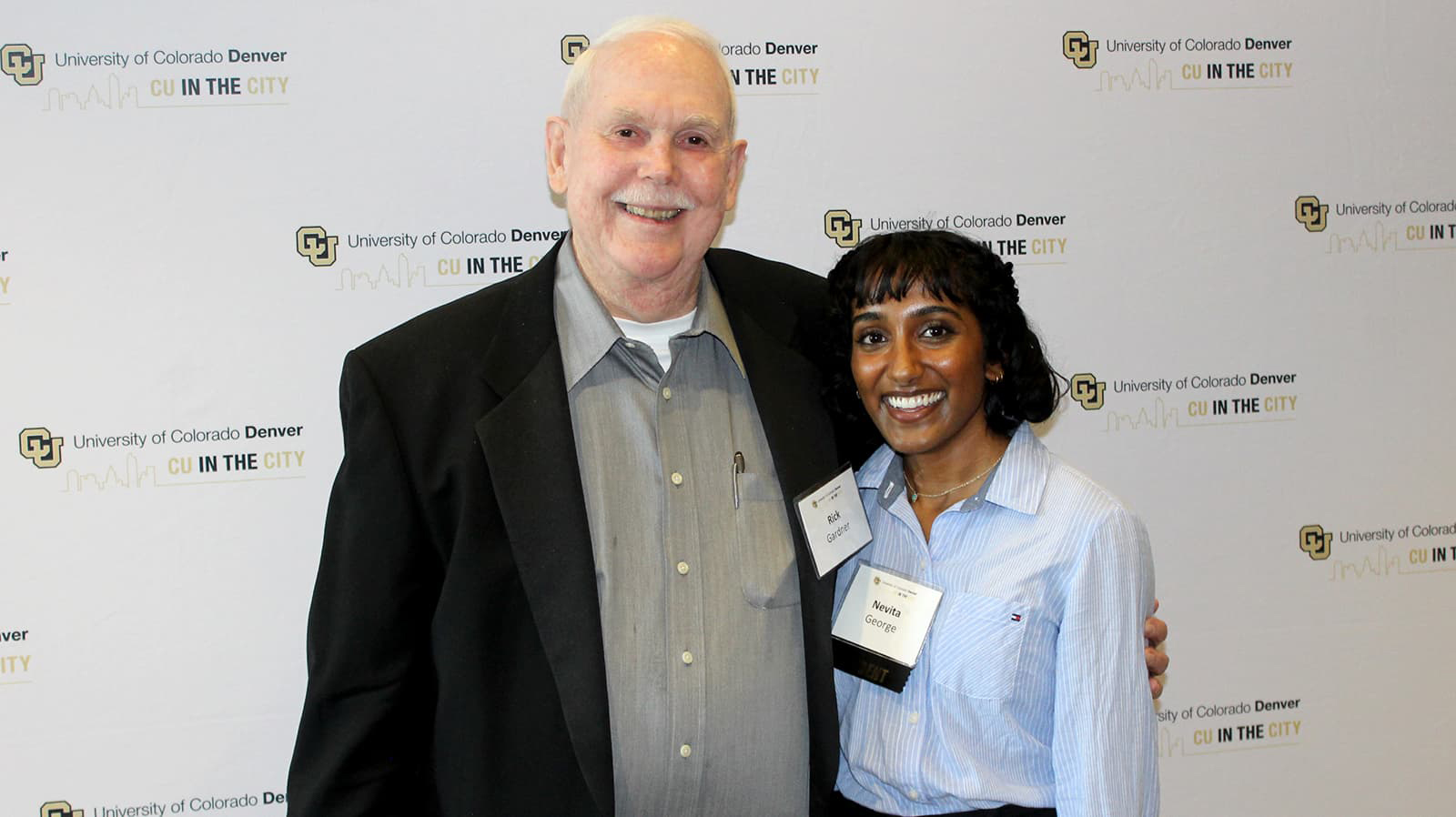A Lifelong Passion Brings a PhD Student to the Pediatric Research in Equity & Prevention Lab
Mar 25, 2022
“Don’t be afraid to ask,” said Nevita George, summing up a life lesson she’s learned from her faculty advisor Sneha Thamotharan, PhD. As a doctoral student at CU Denver, Nevita has seen the power of asking for help, seeking out partnerships, and raising her hand for opportunities.
Last fall, Nevita began a PhD program in Clinical Health Psychology. She previously held a research position at Massachusetts General Hospital, consistently ranked among the top hospitals in the country, where she fell in love with academic health centers and research. “I loved how you could go to another department and ask for their expertise,” Nevita said. “You could put all of your minds together and pursue amazing projects.”
When asked what brought her to CU Denver, Nevita answers without hesitation: “It was Dr. T. who drew me in.” Dr. Thamotharan is an assistant professor in the Department of Psychology, overseeing the Pediatric Research in Equity & Prevention Lab. A licensed psychologist, she has focused her clinical practice on underserved and minoritized youth. Through her research and teaching, she advances health equity by targeting disparities in care among youth of color—particularly young women—and promoting culturally and gender responsive health services.
A Lifelong Passion for Health Equity and Youth
Nevita’s own passion for health equity began in childhood, rooted in personal experience. “I grew up in Texas—a very small town in Texas,” Nevita said. “Race wasn’t just something I could escape from and pretend wasn’t there.” Nevita experienced firsthand how the systems she was born into, including the healthcare system, treated young women of color.
As an undergraduate, Nevita studied psychology and neuroscience at Texas A&M University. She served as a research assistant in the Mathur Social Neuroscience of Pain Lab, where her thesis evaluated how social and cultural factors impact the experience of pain in people of color. Nevita also worked at a telehealth clinic that provided psychological services in rural communities—an experience that opened her eyes to geographic disparities in healthcare.
Throughout college, Nevita volunteered with organizations like the Nabor House Community, where she supported early childhood education for under-resourced families, and Project Sunshine, providing services for children with long-term illnesses, disabilities, and special needs. “I’ve always known I wanted to work with kids,” Nevita reflected.
Finding Mentorship and Community at CU Denver
In Dr. Thamotharan, Nevita found an advisor whose research interests closely align with her own. She also gained a mentor, one who strikes the right balance between providing guidance and support and encouraging independent thought and growth.
As Nevita put it, “she didn’t try to make me fit into her exact mold. We have a shared interest in health equity with pediatric populations, and from there she encouraged me to pursue my own interests.” Nevita is currently working on her master’s thesis, investigating dating violence among young women of color—one piece of a broader research program that examines colorism in pediatric health outcomes.
Dr. Thamotharan’s lab fosters a culture of cross-disciplinary and cross-institutional collaboration. She has forged research partnerships with Children’s Hospital Colorado, Rhode Island Hospital, Brown University’s Warren Alpert Medical School and School of Public Health, Northwestern University’s Feinberg School of Medicine, and BioWink, the maker of the menstrual health app Clue.
Nevita herself is also part of collaborations on campus and across the state, serving on the Equity, Diversity & Inclusion Committee in her Clinical Health Psychology program and as diversity chair of the Colorado Psychological Association of Graduate Students.
A Vote of Confidence
In addition to Dr. Thamotharan, Nevita found support in another important figure in the Department of Psychology, professor emeritus Rick Gardner, PhD. Together with his wife Betty Ann, he established the Rick and Elizabeth Gardner Doctoral Fellowship. Their endowed scholarship helps attract diverse cohorts of talented students like Nevita to CU Denver’s Clinical Health Psychology PhD program.
Not only does Dr. Gardner’s fellowship recruit top talent to the program he helped build, it also keeps him connected with the CU Denver community. "It gives me a great deal of joy,” he said, “to make these gifts and meet students who receive the gifts and see how it affects their lives.”
“Dr. Gardner is the sweetest human being,” Nevita said. “He believes in us. He asks about our research interests.” She also noted the important vote of confidence his support provides. “On a very personal level, we all experience self-doubt,” she shared candidly. “We all face barriers and obstacles. I have struggled with believing in myself as much as others believe in me.”
Through his fellowship, Dr. Gardner shows students like Nevita not only that he believes in them, but that he believes in the research they’re undertaking and the promise it holds for our communities. “I care so much about this work and about young women of color,” Nevita said. “It means so much to know that someone else cares, too.”